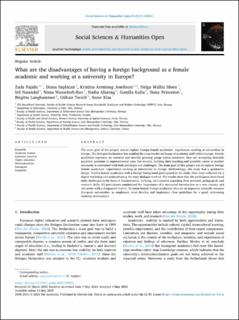| dc.contributor.author | Pajalic, Zada | |
| dc.contributor.author | Saplacan, Diana | |
| dc.contributor.author | Areskoug Josefsson, Kristina | |
| dc.contributor.author | Wallin Moen, Helga | |
| dc.contributor.author | Naustdal, Irli | |
| dc.contributor.author | Rao, Nima | |
| dc.contributor.author | Haj Yasein, Nadia | |
| dc.contributor.author | Kulla, Gunilla | |
| dc.contributor.author | Princeton, Daisy M | |
| dc.contributor.author | Langhammer, Birgitta | |
| dc.contributor.author | Tecirli, Gülcan | |
| dc.contributor.author | Kisa, Sezer | |
| dc.date.accessioned | 2023-05-16T07:50:44Z | |
| dc.date.available | 2023-05-16T07:50:44Z | |
| dc.date.created | 2023-05-04T13:37:06Z | |
| dc.date.issued | 2023 | |
| dc.identifier.issn | 2590-2911 | |
| dc.identifier.uri | https://hdl.handle.net/11250/3068125 | |
| dc.description.abstract | The main goal of this project was to explore foreign female academics' experiences working at universities in Europe. The Bologna Declaration has enabled the cross-border exchange of academic staff within Europe. Female academics represent an essential and steadily growing group within academia; they are occupying desirable academic positions at unprecedented rates. For women, building their teaching and scientific career at another university is associated with both privileges and challenges. The main goal of this project was to explore foreign female academics’ experiences working at universities in Europe. Methodology, this study had a qualitative design. Twelve female academics with a foreign background participated in the study. Data were collected via a digital workshop and analysed using the story dialogue method. The results show that the participants have faced daily challenges in the form of discrimination, bullying, and injustice regarding their personal, pedagogical, and research skills. All participants emphasized the importance of a structured introduction to a new country and university with a designated mentor. To retain female foreign academics who are an important scientific resource European universities, as employers, must develop and implement clear guidelines for a good, welcoming working environment. | en_US |
| dc.language.iso | eng | en_US |
| dc.publisher | Elsevier | en_US |
| dc.rights | Navngivelse 4.0 Internasjonal | * |
| dc.rights.uri | http://creativecommons.org/licenses/by/4.0/deed.no | * |
| dc.title | What are the advantages and disadvantages of having a foreign background as a female academic and working at a university in Europe? | en_US |
| dc.type | Peer reviewed | en_US |
| dc.type | Journal article | en_US |
| dc.description.version | publishedVersion | en_US |
| dc.rights.holder | © 2023 The Author(s) | en_US |
| dc.source.volume | 8 | en_US |
| dc.source.journal | Social Sciences & Humanities Open | en_US |
| dc.source.issue | 1 | en_US |
| dc.identifier.doi | 10.1016/j.ssaho.2023.100551 | |
| dc.identifier.cristin | 2145503 | |
| dc.source.articlenumber | 100551 | en_US |
| cristin.ispublished | true | |
| cristin.fulltext | original | |
| cristin.qualitycode | 1 | |

